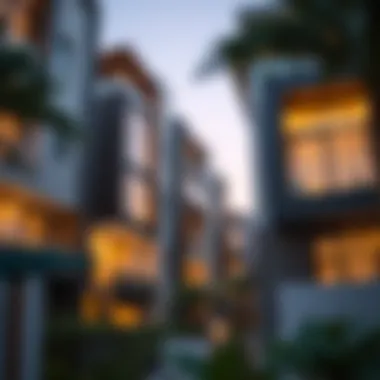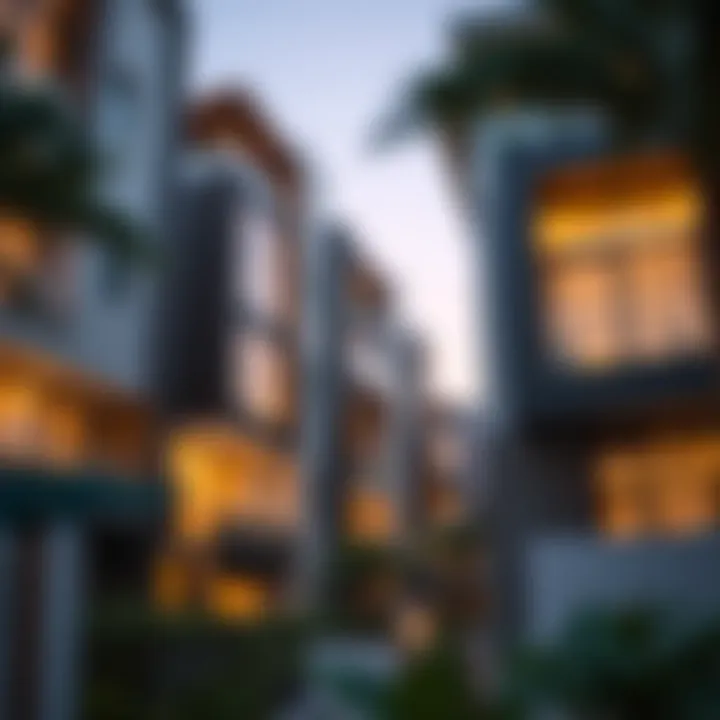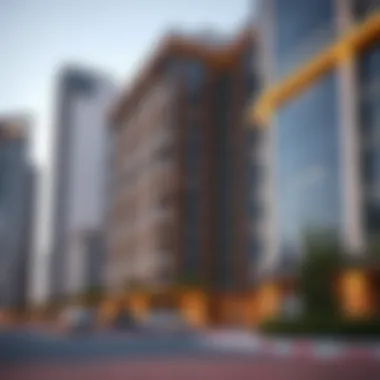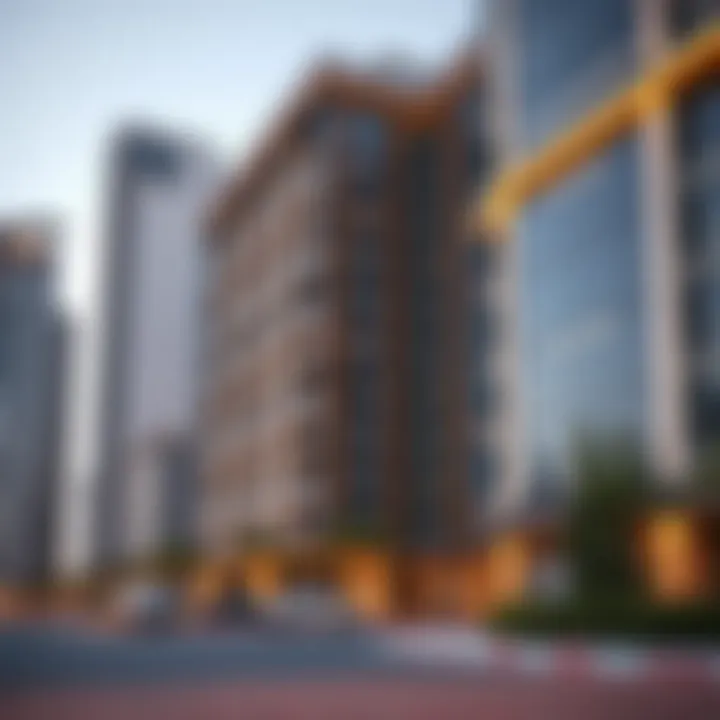Explore Freehold Areas in Dubai's Real Estate Market


Intro
Dubai's real estate scene is a vibrant tapestry woven with opportunities for buyers and investors alike. At the very heart of this landscape lies the concept of freehold areas, a term that carries significant weight in the realm of property ownership and investment within the emirate. Understanding these areas is crucial for anyone wishing to navigate the complexities of Dubai's booming market.
Freehold properties allow non-UAE nationals to own property outright, offering a unique advantage compared to leasehold options, where ownership can be limited. The freehold ownership model not only enhances the allure of investing in Dubai's bustling neighborhoods but also solidifies the emirate's position as an attractive destination for expatriates and investors from around the globe. As we delve into the nuances of freehold areas, it’s essential to recognize how they offer not just real estate opportunities, but also the chance to be part of a dynamic and diverse community.
With so many facades to explore, including the legal frameworks that govern these regions, the premier neighborhoods recognized for their attractive features and valuable amenities, and the current trends that shape market dynamics, this article aims to furnish you with the insights needed to make informed decisions in Dubai's real estate market. Let's begin our exploration into the freehold areas of Dubai for a clearer understanding of their importance and what they have to offer.
Market Insights
The landscape of Dubai's real estate market is constantly shifting. This section outlines the pivotal trends and indicators that define the current atmosphere and guide potential investors.
Current Trends in Dubai Real Estate
Over the past few years, several trends have charted a new course for the Dubai real estate sector. Economic growth, fueled by diversified investments, has laid the groundwork for various significant shifts. The following points highlight key trends:
- Sustainable Development: Eco-friendly projects are becoming increasingly popular, with developments focusing on green living spaces.
- Smart Homes: The integration of technology into residential properties is rising, making homes not just livable but smart and efficient.
- Increase in Foreign Investments: Global investors are taking a keen interest in Dubai due to its stable market conditions and the attractive return on investments.
Key Indicators of Market Performance
To gauge the health of the real estate market, it's essential to consider specific performance indicators. The most significant metrics include:
- Sales Transactions: The number of property sales occurring provides insight into market activity.
- Average Price per Square Foot: This figure indicates the value of properties and can signal whether markets are appreciating or depreciating.
- Rental Yields: A key measure for investors, it highlights the profitability of rental properties across different neighborhoods.
“As the market evolves, those informed about the current trends and key indicators will make the savvy moves needed to seize opportunities.”
Investment Strategies
Investing in freehold areas requires not just financial backing but strategic thinking. Below are practical approaches and insights for potential investors.
Smart Buying Tips for First-Time Investors
Stepping into the property market can feel daunting for first-timers. Here are some actionable tips for a smooth entry:
- Research Thoroughly: Familiarize yourself with the neighborhoods, market rates, and legal requirements.
- Hire a Local Realtor: An experienced real estate agent can assist with navigating paperwork and finding the right property.
- Evaluate the Developer's Reputation: Look into past projects and client testimonials, ensuring that you invest with a reputable developer.
Understanding Rental Yields and ROI
In real estate, understanding the return on investment is critical. Knowing rental yields can help you make a well-informed purchase. Here are aspects to consider:
- Calculate Potential Rental Income: Assess average rent in the area to project future earnings.
- Consider Location Factors: Proximity to amenities, schools, and public transport greatly influences desirability and rental value.
- Keep Track of Market Trends: Understanding how the local economy affects property prices and rents is crucial for making smart investment choices.
With the narrative of freehold ownership unfolding, both residents and investors can gain deep insights into the opportunities waiting in Dubai's real estate landscape.
Prologue to Freehold Areas in Dubai
Diving into the world of Dubai's real estate, freehold areas stand out as a beacon of opportunity for various stakeholders. Understanding the concept of freehold property is essential for anyone looking to invest or buy a home in this dynamic city. Unlike leasehold properties, where ownership is temporary, freehold allows buyers to have complete ownership of the land and the building on it—a significant advantage in a booming market.
The importance of freehold areas in Dubai transcends mere ownership; they represent a shift in the local real estate landscape, aligning with Dubai's ambitious vision to attract global investors and enhance its reputation as a modern city. The availability of freehold properties since the early 2000s marked a turning point, inviting expats and foreign investors to stake their claims in this vibrant market.
Investors are particularly drawn to freehold areas due to their inherent benefits. For instance:
- Complete Ownership: Buyers enjoy uninterrupted ownership of their properties, which translates to better long-term investment stability.
- Personal Freedom: Owners have the liberty to modify or sell their property without the constraints typically tied to leasehold agreements.
- Rising Value: Freehold areas have shown promising appreciation in value over the years, making them a sound investment.
It's also vital to consider the varying aspects of these areas, such as location, amenities, and community features, all of which can affect the desirability and return on investment. In this section, we will outline how understanding freehold areas can offer potential investors and homeowners a clearer picture as they navigate the complexities of Dubai's property market.
Freehold ownership isn’t merely about having a deed; it’s about becoming part of Dubai’s diverse cultural tapestry. As the city continues to evolve, staying informed about the trends and regulations impacting freehold areas will be key for investors and property owners looking to make informed decisions.
"The allure of Dubai’s freehold properties lies not just in their ownership but in the lifestyle they promise."
Through subsequent sections, this article will explore the historical context, legal frameworks, and top locations offering freehold opportunities, enabling readers to develop a more profound insight into the significance of these areas in Dubai's real estate market.
Historical Context of Property Ownership in Dubai
Dubai's journey from a small fishing village to a global city is rich and complex, forming the backdrop for an understanding of property ownership today. In this section, we delve into how historical milestones have shaped the current real estate landscape, especially regarding freehold properties.
Initially, most land in Dubai was owned or controlled by the government. With the rapid growth in trade and tourism, particularly in the late 20th century, the demand for foreign investment surged. The local government recognized this trend and adjusted its property laws to accommodate expatriate investors. This pivotal shift marked the transition to greater property ownership opportunities for foreigners, allowing them to own freehold properties in designated areas.
Early Land Regulation
Back in the day, property rights in Dubai were primarily traditional and communal. It was only when Sheikh Rashid bin Saeed Al Maktoum, the then Ruler of Dubai, sought to develop a more structured economy and attract foreign investments that formal land ownership laws began to take shape. The introduction of structured land regulations in the late 1990s was pivotal. The 2002 decree allowing non-UAE citizens to own freehold property in designated areas was a game changer.
- Significance of the 2002 Decree:
This decree was designed to boost economic growth and attract global investors, resulting in a tremendous influx of capital and development in areas such as Dubai Marina and Palm Jumeirah. Today's skyline is a testament to the success of this approach.
The Boom Years
With these regulations in place, the 2000s witnessed an extraordinary boom in the property market. Investors from all corners of the globe began grappling for a piece of Dubai’s burgeoning real estate pie. Luxury developments emerged almost overnight, transforming the city into a property investor's haven. The thirst for land and properties saw prices skyrocket, and speculative investments began reshaping the market dynamics.
Surges and Corrections
However, as the saying goes, all that glitters is not gold. The real estate market experienced significant corrections around 2008 due to the global financial crisis. For several years, property values plummeted, leading to a reconsideration of investment strategies in Dubai. Nevertheless, keen investors and developers soon regained their footing and adapted to the new market conditions. The government introduced measures to stabilize the real estate sector, showcasing a resilient commitment to nurturing a flourishing investment climate.
Present-Day Landscape
Today, the historical context of property ownership in Dubai sets the stage for potential investors and homeowners alike. With a reinforced legal framework and the backing of government initiatives to bolster the economy, freehold areas now offer significant advantages for property owners. This rich backdrop not only informs current market conditions but also showcases Dubai’s determination toward becoming a prominent hub for real estate, thus attracting savvy investors every day.
"Understanding where we came from is crucial to knowing where we are headed. In Dubai, the evolution of property ownership continues to redefine opportunities for all stakeholders."


In summary, the historical context of property ownership in Dubai lays a vital foundation for understanding freehold properties. It highlights the strategic moves by the government to enhance the real estate market, making it imperative for present and prospective investors to grasp the implications of this history as they navigate the evolving landscape of Dubai's freehold areas.
Defining Freehold Property
In the realm of real estate, particularly in Dubai, the term "freehold property" carries significant weight. Understanding what freehold property means is crucial for anyone looking to invest, reside, or navigate the bustling property market of this vibrant city. At its core, freehold property refers to the ownership of land and buildings thereon without any time limitations, allowing owners complete control over their property.
The concept of freehold ownership stands in stark contrast to leasehold arrangements, which often restrict control and duration. Specifically, in Dubai, freehold property allows expatriates to own a stake in the dynamic landscape of the emirate, providing a sense of permanence and autonomy in a city known for its rapid evolution.
Key Features of Freehold Property:
- Full Ownership Rights: As an owner, you hold the title deed in your name, granting you the authority to modify, lease, or sell the property without interference from others.
- Long-term Investment: Freehold properties tend to be seen as a safer investment option, as there are no looming lease expirations or renewal uncertainties. Owners can build their long-term financial strategies around these assets with greater confidence.
- Livability and Personalization: Owners find greater freedom to personalize their space. Whether it's a fresh coat of paint or a renovation of the living area, freehold properties offer owners the ability to truly make the space their own.
Owning freehold property in Dubai means security and freedom, two vital components for investors and homeowners alike.
Considerations When Defining Freehold Property:
While the allure of freehold ownership is strong, potential buyers should remain aware of several considerations. Legal obligations related to property maintenance and compliance with local regulations are paramount. Additionally, market fluctuations can impact property values, so conducting thorough research is crucial.
Overall, the definition of freehold property encompasses not just ownership but also the lifestyle enhancements and investment opportunities it provides. This understanding sets the stage for deeper exploration into the market's nuances, from financial implications to the future of freehold areas in the lively city of Dubai.
To gain deeper insights into property regulations, check out resources such as Dubai Land Department or related discussions on Reddit.
Understanding the full scope of freehold ownership can greatly enhance your decision-making process within Dubai's real estate landscape.
Legal Framework Governing Freehold Areas
The legal framework surrounding freehold areas in Dubai is a pivotal component that shapes the real estate landscape. Understanding these laws is essential for investors, homeowners, and real estate professionals. This framework encompasses various aspects, including property rights, ownership conditions, and regulatory compliance. By grasping the legalities, stakeholders can navigate potential pitfalls and seize opportunities in Dubai's thriving property market.
Understanding Land Ownership Laws
In Dubai, land ownership laws are intricate and designed to accommodate the diverse demographics that the city attracts. Under the law, freehold property owners hold complete ownership over their assets. This means they can buy, sell, lease, and even bequeath the property as they see fit. It’s important to note, however, that regulations differ based on nationality.
Key points regarding land ownership laws include:
- Non-Emirati Ownership: Foreign investors can purchase property in designated areas, boosting the city’s appeal as a global investment hub.
- Duration of Ownership: There’s no tenure limitation for freehold properties, ensuring long-term investment security.
- Registration Mandate: All property transactions must be registered with the Dubai Land Department, affirming legitimacy and upholding property rights.
- Restrictions on Land Use: Owners must adhere to zoning laws and property-use regulations imposed by the authorities.
In essence, these laws are not merely legal text but form the bedrock of trust in the property sector.
Role of the Dubai Land Department
The Dubai Land Department plays a crucial role in maintaining the integrity of freehold property transactions. It ensures transparency, protects buyers and sellers, and promotes a stable real estate market.
Functions of the Dubai Land Department include:
- Property Registration: The Department is responsible for registering all freehold property transactions, signaling official ownership and rights.
- Dispute Resolution: It provides mediation services for disputes regarding property ownership, ensuring a fair resolution.
- Market Regulation: By monitoring real estate activities, the Department helps sustain a healthy market environment, deterring fraudulent practices.
- Resource Availability: The Department offers resources and guidance for potential buyers, making it easier for them to understand their rights and obligations.
The Dubai Land Department not only oversees property dealings but also embodies the regulatory spirit of Dubai's commercial property landscape.
Through these roles, the Dubai Land Department fortifies the legal framework, ensuring that all stakeholders operate within the bounds of the law while fostering a trusting real estate environment.
Top Freehold Areas in Dubai
When diving into the vibrant real estate market of Dubai, the concept of top freehold areas cannot be overlooked. This section sheds light on these regions, highlighting their significance and allure for various stakeholders, including investors, homeowners, and developers.
The term "freehold" denotes ownership of property, giving individuals the right to buy, sell, and make changes to their real estate without the restrictions often associated with leasehold agreements. This flexibility is particularly attractive in a place like Dubai, which boasts a dynamic property landscape driven by both local and expatriate investments. Knowing the top freehold areas is essential for anyone looking to invest wisely in real estate, as these regions typically offer better long-term value, desirability, and return on investment.
Understanding the nuances of freehold property ownership helps potential buyers compare locations and pinpoint where their money might best be spent.
Dubai Marina
Dubai Marina stands as one of the most sought-after locales in the city. This area boasts a unique blend of modern architecture, upscale shopping, and waterfront living. The shimmering waters of the Arabian Gulf coupled with stunning skyscrapers create an image that attracts residents and tourists alike.
Many developers have poured resources into creating luxurious residential units and amenities that cater to a high-end clientele. From penthouses with panoramic views to lively cafes lining the marina, life in Dubai Marina encapsulates convenience and style. Additionally, with its proximity to the business districts, it's not just a pretty face; it's a practical choice for professionals.
Downtown Dubai
Next up is Downtown Dubai, often referred to as the heart of the city. Here, you’ll find the iconic Burj Khalifa, the tallest building in the world, alongside the dazzling Dubai Mall. The area reflects a mix of elegance and vibrancy that appeals particularly to those who wish to live at the center of luxury and entertainment.
Investors regard Downtown as a prime location due to its established brand and high demand for both commercial and residential properties. The ongoing developments and planned expansions promise to further enhance its allure, making it a hotbed for investment opportunities.
Palm Jumeirah
Then we have Palm Jumeirah, an architectural marvel that features luxury villas, stylish hotels, and exclusive beach clubs. Often considered a symbol of Dubai's opulence, the palm-shaped island offers a unique living experience with its private beaches and world-class dining.
However, it's not just about aesthetics; Palm Jumeirah's properties have shown resilience in their investment potential, attracting both local and foreign investors. The lifestyle, sunshine, and stunning views are unrivaled, marking this area as a top contender in freehold property ownership.
Jumeirah Lakes Towers
Lastly, let’s explore Jumeirah Lakes Towers (JLT), which, unlike the glitzy façade of the previous areas, strikes a balance between affordability and a pleasant living environment.
JLT comprises multiple towers surrounding shimmering man-made lakes, providing a serene setting in the heart of the urban buzz. It's popular among young professionals and families alike due to its more budget-friendly prices compared to sites like Dubai Marina and Downtown. With numerous amenities and a strong sense of community, JLT remains an attractive place for those looking to invest without breaking the bank.
"Identifying the right location is half the battle in real estate investment—and freehold properties in these top areas set the stage for success."
As we navigate through this article, understanding these locations will equip potential buyers with crucial insights, helping them make informed decisions.
Comparing Freehold and Leasehold Properties
When investing in real estate, understanding the difference between freehold and leasehold properties is as vital as knowing the market trends. Selecting the right property might determine whether your investment flourishes or fizzles. This section will unfold the key distinctions, benefits, and considerations related to freehold and leasehold properties in Dubai, which can aid investors, homeowners, and real estate professionals in making informed decisions.


The Essentials of Freehold vs. Leasehold
To kick things off, it's crucial to define what these terms mean in simple terms. Freehold properties grant the owner full rights to the property and the land it sits on. They can make alterations, sell, or rent out the property at their discretion. In contrast, leasehold properties involve owning the right to use the property for a specific period—usually ranging from 30 to 99 years—but not the land beneath it. At the end of the lease term, ownership reverts to the landowner.
Key Distinctions
- Ownership Rights
Freehold: Complete ownership, including land.
Leasehold: Ownership limited to a lease period. - Investment Security
Freehold: More secure long-term investment, as ownership is indefinite.
Leasehold: Investment value may diminish closer to lease expiry. - Maintenance Responsibilities
Freehold: Owners are fully responsible.
Leasehold: Maintenance costs may be shared with the landowner. - Flexibility
Freehold: Greater flexibility to modify or enhance property.
Leasehold: Restrictions may apply to changes and alterations.
Those investing in Dubai's vibrant property market often lean towards freehold due to the autonomy and long-term benefits it offers.
Benefits of Freehold Properties
Investors find numerous advantages in freehold properties:
- Asset Control: Freehold ownership allows complete control over the asset, from selling to leasing.
- Capital Appreciation: Historically, freehold properties in Dubai have shown a higher potential for capital growth. For example, areas like Downtown Dubai, where demand remains high, often see significant appreciation rates.
- Rental Returns: Investors can benefit from stable rental yields, attracting both local and expatriate tenants.
Considerations for Leasehold Properties
While leasehold properties may offer lower initial investment costs, there are considerations to keep in mind:
- Finite Ownership: Leasehold properties can lead to uncertainty regarding asset value as the lease period shortens. Understanding when a lease expires is essential for investment strategy.
- Landlord Relations: Depending on the lease terms, ongoing interactions with the landowner may be necessary for maintenance or approval of modifications.
Closure of Comparison
In summary, the choice between freehold and leasehold properties involves weighing autonomy against temporary arrangements. Both have their places in Dubai’s booming real estate scene, but understanding the full scope of your investment by comparing these two options is crucial. This insight can not only help newly minted investors navigate the property market but also assist seasoned investors in maximizing their portfolios.
It’s worth noting that every property is unique, and carrying out thorough due diligence is always a prudent step in making any real estate decision. As the saying goes, "forewarned is forearmed."
For more information on real estate terms and local regulations, you may visit Dubai Land Department, where a wealth of resources can provide additional clarity.
Financial Implications of Freehold Properties
Understanding the financial implications of freehold properties is crucial for anyone looking to invest or live in Dubai. This exploration will focus on several core aspects that influence potential buyers—initial investment considerations, ongoing costs, and the potential for property value appreciation. These factors not only dictate affordability but also determine how these investments can grow over time.
Initial Investment Considerations
- Down Payment: Typically, the initial deposit can range from 20% to 25% of the property's value. Some developers may offer options that allow for lower percentages, especially for first time buyers.
- Registration Fees: These are generally around 4% of the property’s purchase price and are payable to the Dubai Land Department. It’s a fee that, while mandatory, is often overlooked by first-time buyers.
- Real Estate Agent Fees: Employing the services of a real estate agent usually incurs a 2% fee based on the purchase price. This expense often pays for itself in the value the agent can add through skilled negotiations.
- Additional Costs: Closing costs might include home inspections, legal fees, and non-escrow property transfer fees.
Understanding these factors is essential, as they can significantly affect liquidity and financing strategies.
Operational Costs and Taxation
Once the purchase is made, the financial obligations don’t end. Freehold property owners must be prepared for recurring operational costs and any applicable taxes. The common expenses include:
- Maintenance Fees: Properties in managed communities may charge homeowners monthly or annual fees that cover communal services like landscaping, security, and amenities.
- Property Taxes: Luckily, Dubai does not impose property taxes as seen in many countries. However, municipal fees may apply based on the property’s rental value.
- Insurance: Owners are encouraged to take out property insurance to protect against unforeseen damages, which can add to the overall cost.
- Utility Bills: Regular expenses such as water, electricity, and internet should also be factored into the ongoing budget.
While no property taxes might sound like a sweet deal, the accumulated operational costs can nonetheless impact the bottom line.
Potential for Capital Appreciation
Investing in freehold properties can be as risky as a tightrope walk; yet, if navigated wisely, the financial rewards can be significant. The potential for capital appreciation provides an enticing opportunity for investors. Here are some key elements to consider about property valuation and growth:
- Market Trends: Understanding current market dynamics can inform decisions. Environments that experience rapid development often see significant capital appreciation. Neighborhoods like Dubai Marina and Downtown Dubai have shown remarkable increases in property values due to continuous demand and infrastructure advancements.
- Location Considerations: Properties in proximity to key amenities—such as transportation links, shopping centers, and schools—tend to appreciate faster than those in less desirable areas.
- Future Developments: Staying ahead of the curve includes keeping an eye on confirmed property developments nearby, as they can significantly influence property desirability and values in the long run. An area slated for new schools, parks, or retail developments will likely see property values rise.
To encapsulate, navigating the landscape of financial implications within Dubai's freehold market can be challenging, yet rewarding when approached thoughtfully. Investors and homeowners need to strike a balance between getting the most bang for their buck while ensuring they remain within their financial means. Knowledge is power, and understanding these financial intricacies can set one on the path to successful property investment.
“The best investment on Earth is earth.”
Investment Opportunities in Freehold Areas
The landscape of real estate in Dubai is transforming rapidly, embracing a wealth of investment opportunities particularly in freehold areas. This transformation is largely fueled by foreign interest and local ambitions, creating a vibrant market for investors. With laws in place that favor property ownership, freehold areas offer attractive options for discerning investors who seek long-term value.
Importance of Investment Opportunities
Understanding the investment opportunities in freehold areas is crucial not only for individual buyers but also for real estate professionals and developers. Here are a few key aspects:
- Security of Ownership: Unlike leasehold agreements, freehold ownership provides investors with full rights over the property. This means buyers can renovate, lease, or even sell properties as they wish, which is a significant advantage.
- Capital Appreciation Potential: The demand for freehold properties has consistently shown an upward trend, leading to favorable conditions for value growth. Properties in popular areas like Dubai Marina and Downtown Dubai often appreciate significantly, offering substantial returns on investment.
- Diverse Property Types: Investors can choose from a variety of property types, from apartment complexes to luxury villas. This diversity caters to various market demands, whether for local families or expatriates looking for high-end living.
Benefits of Investing in Freehold Areas
Investing in freehold properties comes with its share of benefits, making them an attractive option. Here are some reasons to consider:
- Ownership Flexibility: When you own freehold property, your control over it is almost absolute. You can alter the property as needed, subject to building regulations. This flexibility grants peace of mind, knowing that changes to the property can be executed without complicated approvals.
- Rental Income Potential: With the increasing population and a booming expatriate market, rental demand is on the rise in many freehold areas. Investors can capitalize on this by renting their properties, generating a steady income stream.
- Tax Benefits: While Dubai has a reputation for being tax-friendly, freehold properties often come with additional perks. International investors can benefit from tax exemptions, making it an attractive destination for property investments.
Key Considerations
However, diving into investments in freehold areas isn't without its caveats. Investors should be well-aware of potential pitfalls:
- Market Fluctuations: The real estate market can be volatile. Extensive market research is essential to gauge the right time to purchase or sell an investment.
- Regulations and Management: Each property may have its own set of regulations, and not adhering to these can lead to complications. Owners should also consider the management of their properties, especially if they intend to rent them out.
In the end, the allure of freehold areas remains strong for both novice and seasoned investors. By aligning their investments with market trends, potential buyers can find opportunities that not only suit their financial goals but also enhance their portfolio. Ultimately, informed decisions pave the way for prosperous outcomes in Dubai's dynamic real estate sector.
"Investing in freehold property is often seen as a robust vehicle for wealth accumulation over time, particularly in a flourishing market like Dubai."
For more insight and legal details, you can refer to resources such as Dubai Land Department and international guidelines at Invest in Dubai for comprehensive updates on regulations and opportunities.
Trends Influencing the Freehold Market


Understanding the trends influencing the freehold market in Dubai is paramount for anyone looking to make informed investment decisions. This segment not only highlights shifts in buyer preferences but also sheds light on how global economic currents and evolving technology directly impact property values and market dynamics. Keeping an eye on these trends can significantly sway an investor's success and help homeowners choose wisely in this fast-paced property market.
Impact of Global Economic Factors
Global economic factors show a domino effect on the freehold property market in Dubai. When the world economy is flourishing, more overseas investors tilt towards Dubai due to its luxurious lifestyle and business-friendly regulations. For instance, fluctuations in oil prices or political stability in the broader Middle East can either bolster or shake investor confidence. Significant events like the World Expo 2020 also play a role in shaping the landscape, as they not only attract tourists but also draw substantial foreign investments leading to an uptick in demand for properties.
Factors affecting the demand include:
- Foreign Direct Investment (FDI): Increased FDI often correlates with skyrocketing property demand. When investors see Dubai as a safe bet, they are more inclined to purchase freehold properties.
- Economic Policies: Government initiatives aimed at stimulating the economy, such as tax breaks or investment incentives, can encourage capital influx into real estate.
- Tourist Arrivals: An influx of tourists can create a strong rental market, making freehold properties more appealing to investors who anticipate rental returns.
"A thriving economy is not just good for business; it's also the lifeblood of the property market."
Technological Advancements in Real Estate
Technological advancements are reshaping the real estate landscape and are giving the freehold market a fresh perspective. From digital property listings to virtual reality tours, technology is improving accessibility and transparency, making it easier for buyers to find and evaluate their options. Moreover, the rise of proptech companies in Dubai has changed the chemistry of transactions.
Some pivotal changes due to tech include:
- Blockchain Technology: More real estate companies are using blockchain to secure transactions, providing clarity in ownership records and reducing fraud. It ensures a smooth and faster transaction process.
- Smart Homes: With growing awareness among buyers regarding energy efficiency, smart home technologies make properties more appealing. Many freehold options now boast features like automated lighting and integrated security systems.
- Online Marketplaces: Platforms like Property Finder and Bayut allow users to compare properties side by side, obtaining details that previously required days of searching through brochures and making phone calls.The integration of technology not only simplifies transactions but also helps investors analyze market data effectively, driving better investment choices.
In summary, keeping abreast of global economic shifts and the latest technological innovations allows investors and homeowners to make educated decisions in the vibrant freehold markets of Dubai. Whether it's recognizing the impact of a global crisis or leveraging the latest digital tools, staying informed makes all the difference.
Challenges Faced by Freehold Property Owners
Navigating property ownership in freehold areas of Dubai can be rewarding, yet it's not without its hurdles. Understanding the challenges faced by freehold property owners is crucial for anyone looking to invest or live in these areas. The landscape of Dubai's real estate, while lucrative, presents specific complexities that can catch the unprepared off guard.
Regulatory Hurdles
One of the most pressing challenges for freehold property owners are regulatory hurdles. While Dubai has made significant strides in simplifying the property registration process, there are still numerous rules and regulations that property owners must navigate. For example, alterations to property, such as renovations or significant upgrades, often require permits and adherence to building codes set forth by the Dubai Municipality.
In addition, when foreign investors dive into the freehold market, they often face stipulations that can baffle even seasoned buyers. Ownership rules, for instance, might limit certain types of foreign ownership in specific areas. These regulations can shift without much prior notice, throwing a wrench in potential investments.
Moreover, the repercussions of non-compliance can be steep. Property owners risk financial penalties or, in severe cases, could face legal action, leading to a costly and protracted dispute resolution process. Staying abreast of changes in regulations can feel like a full-time job; thus, many owners turn to legal experts or consultants for guidance, adding to overall costs.
Market Saturation Concerns
Market saturation is another crucial issue affecting investors in Dubai’s freehold areas. Initially, the allure of investing in a rapidly developing city like Dubai attracted a significant amount of foreign capital. However, as more properties emerged on the market, the fear of oversupply became a reality. The result? A host of new buildings competing for buyers’ attention, which can lead to rental prices and property values becoming stagnant or even declining in certain markets.
Owners may find themselves in a spot of bother when demand doesn’t meet the burgeoning supply. This often translates into longer vacancy periods for rental properties and pressures to lower prices to attract tenants or buyers. Factors like location and property condition play pivotal roles; a prime spot like Dubai Marina can still flourish, while less desirable regions may linger in a downturn.
With an influx of new developments, there’s also the fear of quality being compromised. Developers, eager to maximize profits, might skimp on construction quality or amenities, which in turn could affect the attractiveness of the area and its market value. Hence, assessing the balance of supply and demand is vital for prospective buyers.
Property owners must remain vigilant, understanding that the dynamic nature of the Dubai real estate market requires constant adaptation and strategic planning to thrive.
The Future of Freehold Areas in Dubai
The landscape of freehold areas in Dubai is always evolving, creating a buzz among investors and homeowners alike. Understanding what lies ahead is crucial for those looking to invest, create residence, or even flip properties in this dynamic realm. The areas designated as freehold are more than just places to own property; they symbolize growth, opportunity, and a way of life that many aspire to attain.
The attractiveness of Dubai freehold properties stems from their ability to provide long-term security and an asset that has, over the years, shown potential for increased value. Additionally, as global cities grow, Dubai is carving its niche, making its freehold areas more appealing. A significant part of this evolution includes incorporating modern amenities and infrastructure to meet the demands of a changing market.
Predictions for Market Growth
Analysts and real estate experts believe that the future of freehold properties in Dubai is promising. According to various reports, demand for freehold property could see a surge driven by foreign investors. Notably, factors such as increasing expatriate demographics and the allure of vibrant lifestyle choices in Dubai boost this demand. It's anticipated that the market will experience these notable trends:
- Increased Foreign Investment: Investors from various parts of the world are increasingly looking towards Dubai as a stable and lucrative real estate haven. This continuous influx provides a cushion against market fluctuations.
- Tourism Expansion: Dubai’s reputation as a hub for tourism not only drives short-term rental opportunities but also encourages investment in freehold properties as landlords seek more stable, long-term returns.
- Shifts in Demographic Preferences: There is a documented shift towards urban living, especially among millennials who prioritize proximity to amenities and workplace; freehold areas offer attractive living spaces that cater to these preferences.
In essence, as the dust settles on current trends, it's not just about surviving the market changes; it’s about thriving within them. Investors will need to stay ahead of the curve to capitalize on growth opportunities.
Government Initiatives Supporting Development
Dubai's government plays a pivotal role in shaping the future of its freehold areas. Understanding the supportive measures from authorities can provide potential investors with valuable insights:
- Regulatory Reforms: The Dubai Land Department continues to implement laws that promote transparency and ease of doing business for property investors. This not only attracts more foreign investment but also cultivates trust in the market.
- Infrastructure Enhancements: The government is heavily investing in infrastructure to improve connectivity and the general quality of life in freehold areas. Projects like new metro lines, road expansions, and community facilities are in progress, meaning that freehold properties in these regions will likely appreciate as accessibility improves.
- Incentive Programs: Initiatives aimed at encouraging foreign ownership often include streamlined processes for property registration and reduced fees that make investing more feasible for non-residents. This, combined with promotional campaigns for Dubai as a hotspot, amplifies interest in freehold investments.
Making Informed Decisions in Freehold Investments
Making informed decisions in freehold investments is crucial not only for potential investors but also for homeowners looking to secure their futures in Dubai’s real estate landscape. Understanding the nuances of freehold properties can make a difference between a savvy purchase and a buyer’s remorse scenario that's difficult to overcome. This section aims to shed light on essential aspects that inform these decisions, balancing potential risks with rewards.
First and foremost, knowing the key benefits associated with freehold investments forms the cornerstone of informed decision-making. Investors gain the right to own the property outright, which provides security in terms of assets. This ownership can yield considerable advantages, essential for anyone considering long-term residence or rental. Moreover, freehold properties often come with better resale value in the flourishing Dubai market, where demand regularly surpasses supply.
In relation to financial implications, buyers must ponder the ongoing costs tied to property ownership. While the initial investment can be hefty, operational costs such as maintenance fees, homeowners association dues, and taxes on property must be factored into total expenses. Investors should closely analyze these recurring costs against predicted market performance, bearing in mind that fluctuations in the real estate market can significantly impact profitability.
Furthermore, understanding the legal requirements is indispensable for anyone considering a freehold property investment. Familiarizing oneself with laws related to foreign ownership, registration, and property rights can prevent downstream pitfalls. Collaborating with reputable real estate agents and legal professionals can offer invaluable insights. A well-informed investor can dodge the pitfalls that less diligent buyers may fall into, elevating their confidence in making critical decisions.
Another factor to weigh is the location of a potential investment. As previously mentioned in the article, prime freehold areas like Dubai Marina or Downtown Dubai often attract foreign buyers due to their vibrant lifestyle and proximity to amenities. Nonetheless, these areas might come with a higher price tag. Thus, balancing an area’s desirability with affordability should be a key consideration, as many areas outside prime locations have started showing promising growth trends.
While the economic landscape influences property valuations, investors should also keep an eye on upcoming developments and government initiatives aimed at enhancing the attractiveness of certain locales. Keeping abreast of these trends can provide significant foresight and potentially the advantage needed to seize lucrative opportunities in a timely manner.
In summary, the art of making informed decisions in freehold investments requires a multifaceted approach, blending understanding of the market, keen analysis of financial elements, and awareness of legal requirements. As the saying goes, "knowledge is wealth." In Dubai’s dynamic property landscape, this holds exceptionally true. Investors who take the time to educate themselves are more likely to enjoy not just the fruits of their investments but also peace of mind as they navigate the complexities of property ownership.
"Investing in real estate is not just about purchasing property, it’s about understanding the landscape and what makes it tick."
For further insights on property ownership laws in Dubai, visit Dubai Land Department. Understanding trends in the real estate market can also be gleaned from Wikipedia. Engaging with like-minded individuals can provide perspective too - consider exploring relevant discussions on platforms like reddit.com.
By keeping these factors in mind, potential investors can go into the freehold market equipped with a solid understanding, ready to make decisions that align with their financial goals and lifestyle aspirations.
The End
As we draw our exploration of freehold areas in Dubai to a close, it’s essential to reflect on the core tenets elucidated throughout this discussion. Freehold property ownership stands as a pivotal aspect of the real estate landscape in Dubai. It isn’t merely about owning a piece of land or a building; it intertwines with the broader perspective of investment opportunities, legal rights, and the socio-economic fabric of the city.
Navigating the freehold market can seem daunting, especially for newcomers. However, understanding the legal frameworks that govern ownership, the historical context which shaped current laws, and the dynamic nature of property values are key elements that can empower informed decision-making. The significance of recognizing reputable areas, like Dubai Marina and Downtown Dubai, cannot be overstated, as they present unique advantages that cater to diverse investment strategies.
The potential for financial appreciation in freehold properties often attracts investors. Yet, one must be keenly aware of the operational costs and the market trends that can influence long-term viability. This understanding aids homeowners in budgeting effectively and strategizing on the maintenance of their properties. As we discussed, incorporating technology and being aware of global economic factors could also refine one’s investment approach.







